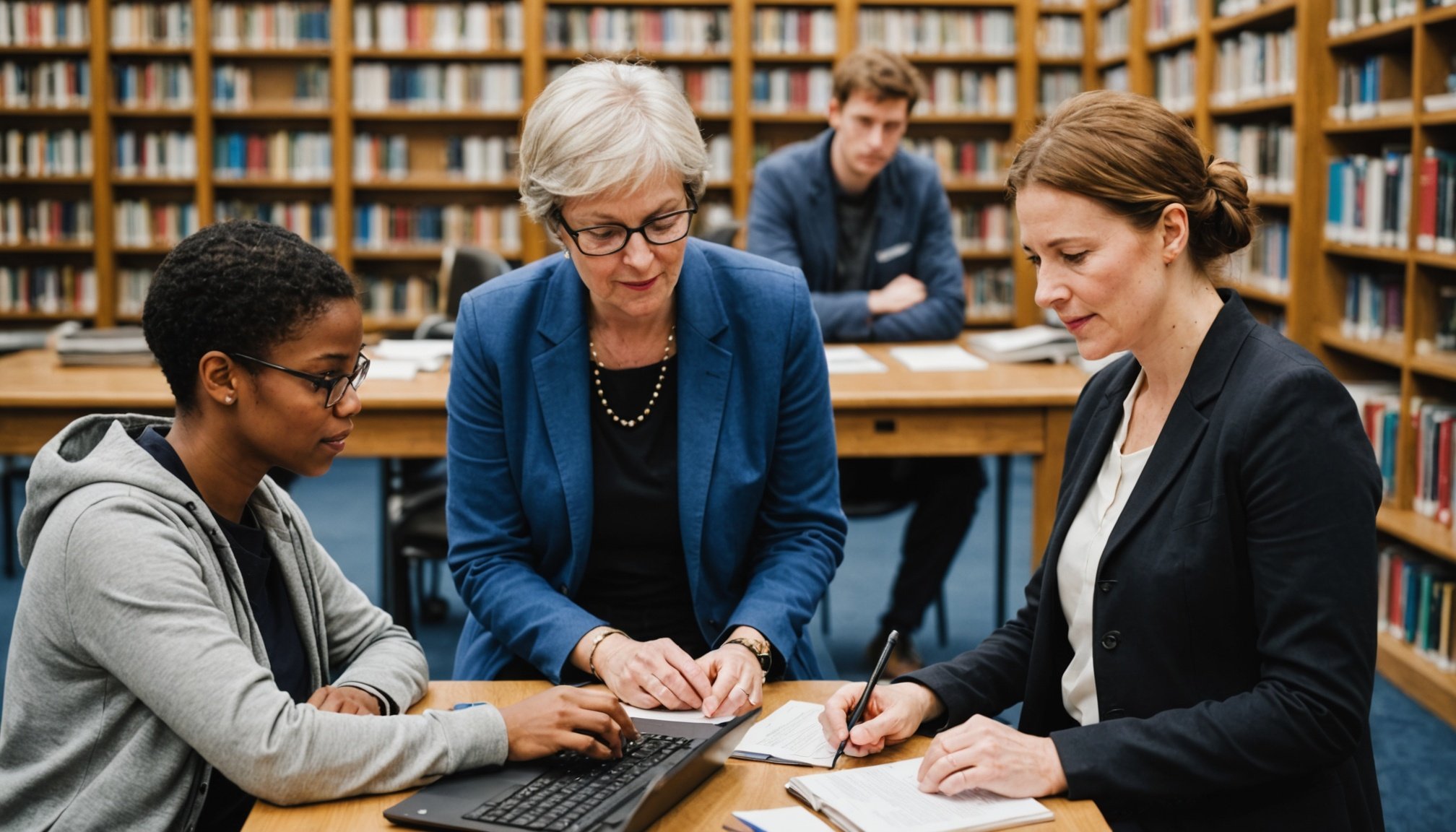Overview of Digital Skill Empowerment in UK Libraries
Digital skills are essential in today’s world, enhancing everything from personal productivity to employment prospects. Libraries play a crucial role in community engagement, acting as vital hubs for the advancement of digital skills. These institutions are not merely storage places for books; they are dynamic spaces that offer resources and libraries’ initiatives to boost digital literacy.
In the UK, numerous libraries have embarked on innovative programs to foster these skills. These initiatives reflect a deep commitment to equipping individuals with the capabilities needed to navigate contemporary technological landscapes. Libraries facilitate workshops, provide access to digital devices, and offer personalised support to individuals at all skill levels.
Additional reading : Overcoming Obstacles: Key Challenges of AI Integration in UK Education
Among the current initiatives, libraries are focusing on various aspects: from basic computer literacy classes to more advanced coding workshops. They offer essential services such as free Wi-Fi, training sessions, and access to online learning platforms. These services enable community members to engage with technology confidently, ensuring they are not left behind in the digital age.
Some libraries have also forged partnerships with local organisations and tech companies to enhance their offerings. Such collaborations enable broader outreach and create more opportunities for learners. The focus on digital skills helps foster informed, empowered communities ready to meet the demands of an increasingly digital world.
In the same genre : Mastering UK Recruitment: Key Legal Insights for AI Implementation
Effective Strategies for Enhancing Digital Skills
Libraries across the UK are innovating with digital training programs that cater to a wide range of skill levels. These programs include structured technology workshops and community classes designed to provide hands-on experiences with modern gadgets and software. Participants can engage in activities that range from learning the basics of operating a computer to mastering complex coding languages or digital design tools. This hands-on approach ensures that individuals of all ages and backgrounds develop confidence in using technology.
What makes these initiatives particularly effective is their emphasis on personalised learning. Libraries often employ tech-savvy instructors who can adapt teaching methods to suit different learning styles, ensuring participants gain the most from their experience.
Furthermore, libraries utilise a variety of technology resources including laptops, tablets, and specialised software that might otherwise be inaccessible to many community members. These resources are available during workshops, allowing learners to practice in a supportive environment.
Notably, libraries provide these opportunities at little to no cost, removing financial barriers that might impede skill development. Their commitment to community engagement naturally fosters a supportive network where learners can share experiences and help one another grow, ultimately creating technologically empowered communities.
Case Studies of Successful Library Programs
Exploring success stories in UK libraries reveals the tangible impact these library initiatives have on communities. They provide insightful examples of how tailored programs can effectively boost digital skills.
Library A: Program Overview
Library A’s initiative aimed at bridging the digital divide targets underrepresented groups, including seniors and job seekers. The program provides a series of interactive workshops focusing on basic to advanced digital competencies. Key outcomes highlight increased community engagement and improved participant confidence in technology use. Feedback praises the approachable format and supportive environment, underlining the program’s role in fostering inclusion and digital empowerment.
Library B: Program Outcomes
Library B reports high engagement levels, notably among diverse demographics. Success metrics indicate significant upticks in employability and digital literacy among participants. Testimonials spotlight transformative experiences, with individuals leveraging newfound skills in professional contexts. Challenges such as initial tech apprehension were combated through persistent encouragement and adaptive instruction.
Library C: Unique Approaches
Library C differentiates itself through distinct strategies, like game-based learning to make digital education enjoyable. Collaborations with local organisations amplify outreach, integrating technology into community events to maximise impact. Stakeholder feedback reveals a substantial increase in community participation and a deepened interest in lifelong learning.
Resources Available for Digital Skill Development
Libraries in the UK are providing a variety of educational resources aimed at enhancing digital skills among community members. These include access to digital tools such as computers and tablets equipped with the latest software, necessary for learning and development.
A significant number of libraries have integrated online platforms into their services, enabling remote access to learning materials. This addition supports flexible learning environments, allowing users to engage with digital content at their own pace. Online platforms host a range of courses from basic computer literacy to advanced programming modules.
Additionally, partnerships with tech companies play a crucial role in augmenting resources available at libraries. Through collaboration, libraries gain access to innovative tools and training sessions led by industry professionals. These partnerships expand the horizon of digital education, ensuring participants receive up-to-date and relevant training.
Libraries are also keen on providing inclusive resources that cater to diverse learning needs, ensuring equitable access to all community members. Interactive workshops and seminars further supplement availability, offering practical experiences that solidify theoretical knowledge. This concerted effort to offer a variety of educational resources underscores libraries’ commitment to developing digitally savvy and empowered communities.
Barriers to Engagement in Digital Skill Initiatives
In the realm of digital skill initiatives, community barriers often hinder participation. Libraries recognise that accessibility is a significant challenge. For instance, individuals may struggle due to a lack of internet access or suitable devices at home, preventing them from fully engaging with digital resources.
Common accessibility issues also encompass physical limitations, such as inadequate transportation to library locations, affecting those in remote or underserved areas. Additionally, language barriers and lack of digital literacy can pose challenges, deterring potential learners from participating in programmes designed for their development.
However, libraries are actively employing strategies to mitigate these engagement challenges. By offering flexible scheduling and remote learning options, libraries attempt to accommodate diverse needs. Furthermore, outreach initiatives seek to raise awareness in communities about the resources and support available for overcoming these barriers.
Through tailored assistance, including one-on-one tutoring and translation services, libraries aim to create an inclusive learning environment. Addressing these challenges not only helps in bridging the digital divide but also empowers individuals, enabling them to harness technology effectively for personal and professional advancement. The commitment to overcoming barriers and ensuring accessibility underscores the role of libraries in shaping equitable, digitally skilled communities.
Insights and Testimonials from Library Staff and Community Members
Personal stories and testimonials offer valuable insights into the tangible impact of library-led digital skill initiatives. Library testimonials from staff members frequently emphasize the transformative nature of these programs. One librarian noted how a digital literacy class turned hesitant beginners into confident users, sparking excitement about technology in the process.
From the perspective of community voices, participants often share experiences demonstrating profound personal growth. Through direct engagement, individuals have seized opportunities to enhance their professional skills, leading to improved job prospects. A former participant of a coding workshop highlighted how learning new software enabled them to transition into a tech-oriented career.
Staff and community members alike comment on the collaborative atmosphere fostered by these programs. Participant experiences are enriched through peer-learning, where learners support one another on their digital journeys. For many, this sense of shared endeavour within libraries translates into strong community bonds.
Such quotes don’t just reveal increased digital literacy but underscore the role of libraries as inclusive spaces for empowerment. By capturing these narratives, libraries underscore the broad-reaching benefits of digital skill initiatives, affirming their importance in today’s tech-driven environment. These testimonies validate the continuous efforts to bridge digital divides and foster equitable learning spaces.
Insights and Testimonials from Library Staff and Community Members
In the realm of digital skills initiatives, library testimonials provide compelling examples of success and transformation. One librarian noted a significant shift from hesitance to confidence in participants, exemplifying the programs’ power to ignite enthusiasm for technology. Such firsthand accounts highlight the personal and communal growth that libraries facilitate.
From community voices, stories emerge of individuals who have experienced tangible benefits from these programs. Many participants discuss enhanced vocational opportunities, such as improved job prospects stemming from newly acquired digital expertise. A particularly striking testimony came from a workshop attendee who leveraged their new skills to transition into a tech sector career. This example underscores the far-reaching impact of these initiatives.
The culture of participant experiences often reflects a sense of unity and shared learning. Through peer support and collaboration, individuals collectively enhance their understanding of digital technologies, fostering a deeper connection with both their newfound skills and fellow learners. Such environments cultivate robust community bonds, resulting in a network of empowered, digitally literate citizens.
Quotes from diverse participants resonate with themes of personal growth and life-changing opportunities, accentuating libraries’ crucial role in bridging digital divides and championing continuous learning across communities.











